Sharing stories of trauma, roots at Toronto’s 1st Andres Bonifacio fest
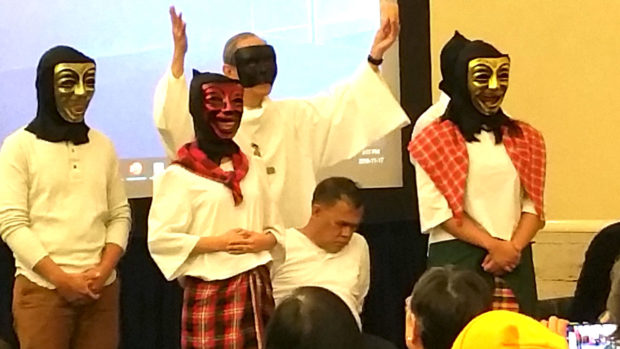
Cast of Carlos Bulosan Theatre play excerpt, “Pugad Lawin: The First Cry.” INQUIRER/Patty Rivera
TORONTO—“Supertyphoon Haiyan hit Central Philippines on November 8, 2013, the strongest typhoon landfall ever-recorded in the world, and affecting 14 million people, with 6,500 reported deaths and unaccounted many others still missing,” reporter Patricia Evangelista, Marshall McLuhan fellow for excellence in journalism, told a hushed audience in Toronto, November 17.
Evangelista spoke at the first Andres Bonifacio Festival Celebration held in Toronto to share her experiences of covering trauma. Evangelista specializes in reporting disasters, conflicts, human rights related stories and extrajudicial killings.
“In the hours after Haiyan, after survivors climbed down trees and staggered down rooftops, there were bodies in backyards leaning on refrigerators, inside houses jammed behind closets, bedrooms and bathrooms. And on the edges of airport roads, bodies wrapped in rainbow-red bedsheets. There were places where container trucks floated in the water, with their drivers’ still clutching steering wheels.”
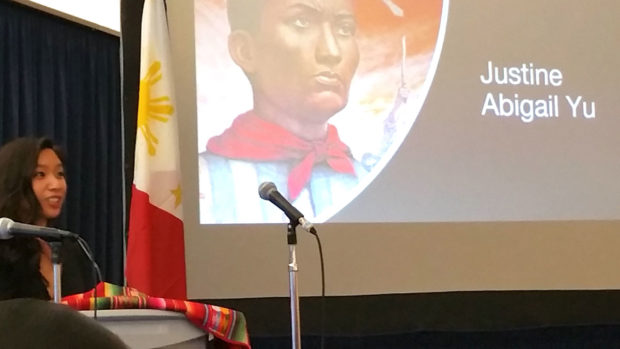
Justine Abigail Yu, Living Hyphen magazine editor and founder. INQUIRER/Patty Rivera
“The stuff of the work I do is called trauma journalism. I didn’t know it back then. I didn’t know there were specific ways to deal with it or rules for it; but ethical journalism matters whatever the story is. The rule is: To do no harm.”
Evangelista said journalists who cover President Rodrigo Duterte’s war on drugs have been accused of politicization and propaganda, bias and exaggeration. “I do not pretend objectiveness. Of the many truths that have become negotiable in recent months, I am certain of one: I am against the murder of human beings, regardless of guilt or innocence.”
It was not only Evangelista who shared stories. Filipino Canadian writers and journalists in Toronto told their stories of being foreign-born or born to mixed marriages, and keeping one’s roots.
They did it through poems, songs, stories, a mini-Balagtasan, and a short play, “PugadLawin: The First Cry,” based on the life of Andres Bonifacio, founder of the Katipunan and leader of the Philippine revolution, who helped the Philippines break free from 333 years of Spanish colonial rule.
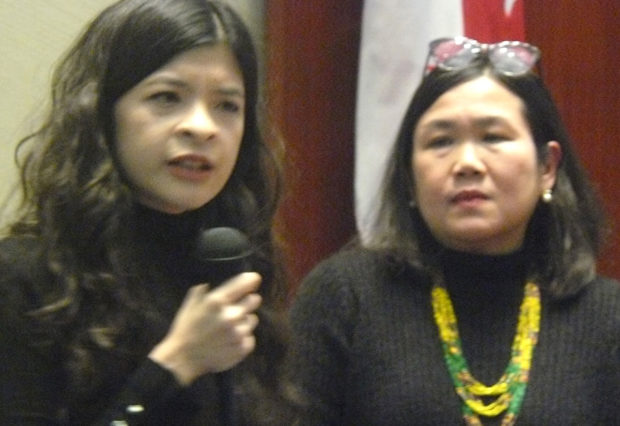
Patricia Evangelista, Marshall McLuhan fellow for excellence in journalism, with moderator Marites Sison. INQUIRER/Patty Rivera
Event organizers led by the Filipino Canadian Writers and Journalists Network also launched their poster, “The Struggle for Philippine Independence,” as well as their website.
For novelist Yves Lamson, the question, “What’s a Filipino?” began as a schoolyard taunt from his best friend. He was six and he and his friend were asking each other about their roots. His quest would soon follow him even to his thirties.
Answering the question “What’s a Filipino?” and defining it as a practice and fractioning it to define its essence, could be counterproductive, Lamson said. “Where were you born, do you speak the language, are you full Filipino or are you mixed, what islands do your parents come from? … Or that I don’t do these X, Y and Z things that I am less of a Filipino.” And the questions come not only from outsiders but also from our own community, he added.
“I caution the elders to choose their words to the generations that come after them. The world is divisive enough. If we continue to question our young as to their Filipino-ness, if we continue to question them as to their birthright and heritage, we will lose them. We must remember that our culture lives in them, our heritage dies with them.”
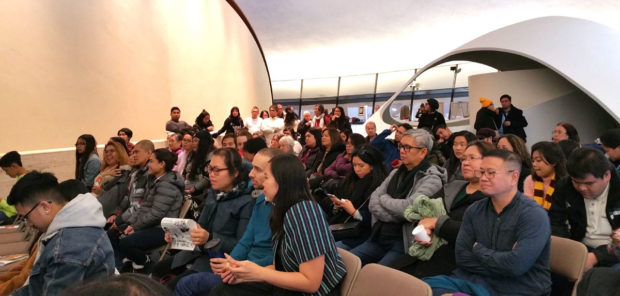
Audience at cultural presentation at Toronto City Council Members Lounge. INQUIRER/Patty Rivera
Justine Abigail Yu, editor and founder of literary magazine Living Hyphen, talked about family visits to the Philippines.
In their family reunion back in 2006, she said, “We filled the master bedroom with mattresses end-to-end and each night was a symphony of snores that kept me up ‘til dawn. Each day was madness as we tried to plan excursions and outings….It was chaos and it was bliss.”
But on this most recent trip, she said, she had “a rude awakening.”
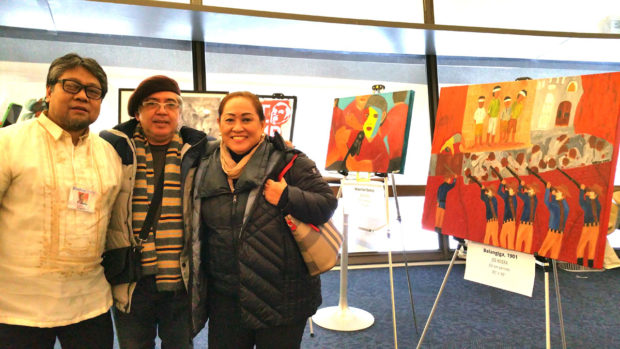
From left, Louie Queano of TV Migrante and Malaya Canada members Ricky Caluen and Marissa Corpus, with Andres Bonifacio Festival art exhibit display. INQUIRER/Patty Rivera
“Everything was the same–the furniture, the rooms, almost everything remained untouched. And yet, there was something there so deeply different. It was just so quiet, so empty. I felt so disoriented on my first few days trying to come to grips with the stillness of the place. It felt like a home for ghosts. A home just for memories.”
Like many Filipinos, she said, her family’s dream had always been to move to Canada or the U.S. “so that we could all have a better life while being close to each other. And here it was. Everyone has left. The emptiness a testament to a dream come true.”
LINKS:
McLuhan Fellow Patricia Evangelista, multimedia journalist from the Philippines, speaking at Andres Bonifacio Festival Celebration, Toronto, November 17, 2019.
Yves Lamson, author of Bodies of Water, at Andres Bonifacio Festival Celebration, Toronto, November 17, 2019.
Soprano Lilac Caña, singing Andres Bonifacio’s poem, “Pag-ibig sa Tinubuang Lupa,” at Andres Bonifacio Festival Celebration, Toronto, November 17, 2019.
Filipino Canadian rapper Han Han singing “Babae,” at Andres Bonifacio Festival Celebration, Toronto, November 17, 2019.

